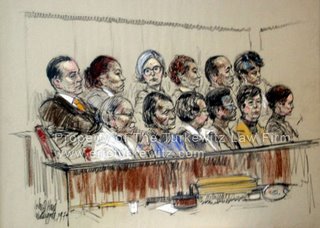
New York’s high court today threw out a plaintiff’s verdict in a medical malpractice case because the court refused the request of the plainitff to poll the jury at the time the verdict was rendered.
The decision in Duffy v. Vogel, authored by our new Court of Appeals Chief Judge Jonathan Lippman, came after a plaintiff’s verdict of $1.5M in a medical malpractice case. He wrote:
In New York, we have long recognized that affording jurors a last opportunity individually to express agreement or disagreement with the reported verdict, is, when requested by a litigant, indispensable to a properly published, and thereby perfected, verdict.
…
Inasmuch as, under New York law, the honor of a request for a jury poll is a necessary condition of a “finished or perfected” verdict, it follows that in this State’s courts the failure to poll a jury may never be deemed harmless. Harmless error analysis is a judicial device employed to sustain an already perfected verdict, not to perfect a verdict in the first instance.
…
The proper publication of a verdict in open court, so long deemed essential to assure the integrity of the verdict, is not to be cast aside as a mere formality on the theory that jurors are prospectively bound to act in accordance with their verdict sheet signatures.
The dissent would have held this to be harmless error.
The appellate division’s decision said in part “…and during the foreperson’s recitation of the verdict in open court, no juror cried out in protest.”
When have you ever had a juror “cry out in protest” during the reading of the jury verdict? I haven’t, and I know most trial attorneys have not had that situation.
Poll the jury. It takes all of 20 seconds.
# posted by Blogger Gerry Oginski : March 31, 2009 5:27 PM
How does polling a jury work? Does this apply in criminal cases too? In Australia the jury deliberations are supposed to be confidential. Rarely do jurors comment in public on what went on although some miscarriages of justice have been exposed because there have personalities that dominated or because jurors went on frolics of their own to check evidence. What difference would have it made to the verdict? It wasn’t clear to me how a plaintiff who had won would have benefited. Leave well enough alone if a jury gives you what you want.
# posted by Anonymous Terence O’Riain : April 06, 2009 8:19 PM
It’s simple. The verdict is first read, Then, upon the request of a party, each juror is questioned as to whether they agree with the verdict.
This insures that the deliberations didn’t result in a verdict by coercion within the secret confines of the jury room. A juror can stand up in court and say that s/he doesn’t agree.
# posted by Blogger Eric Turkewitz : April 06, 2009 9:50 PM